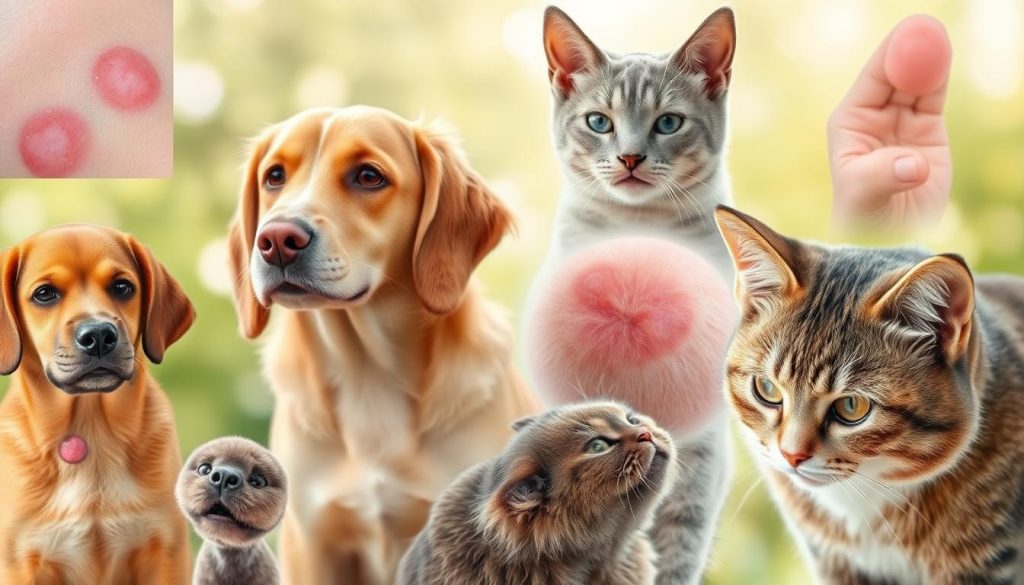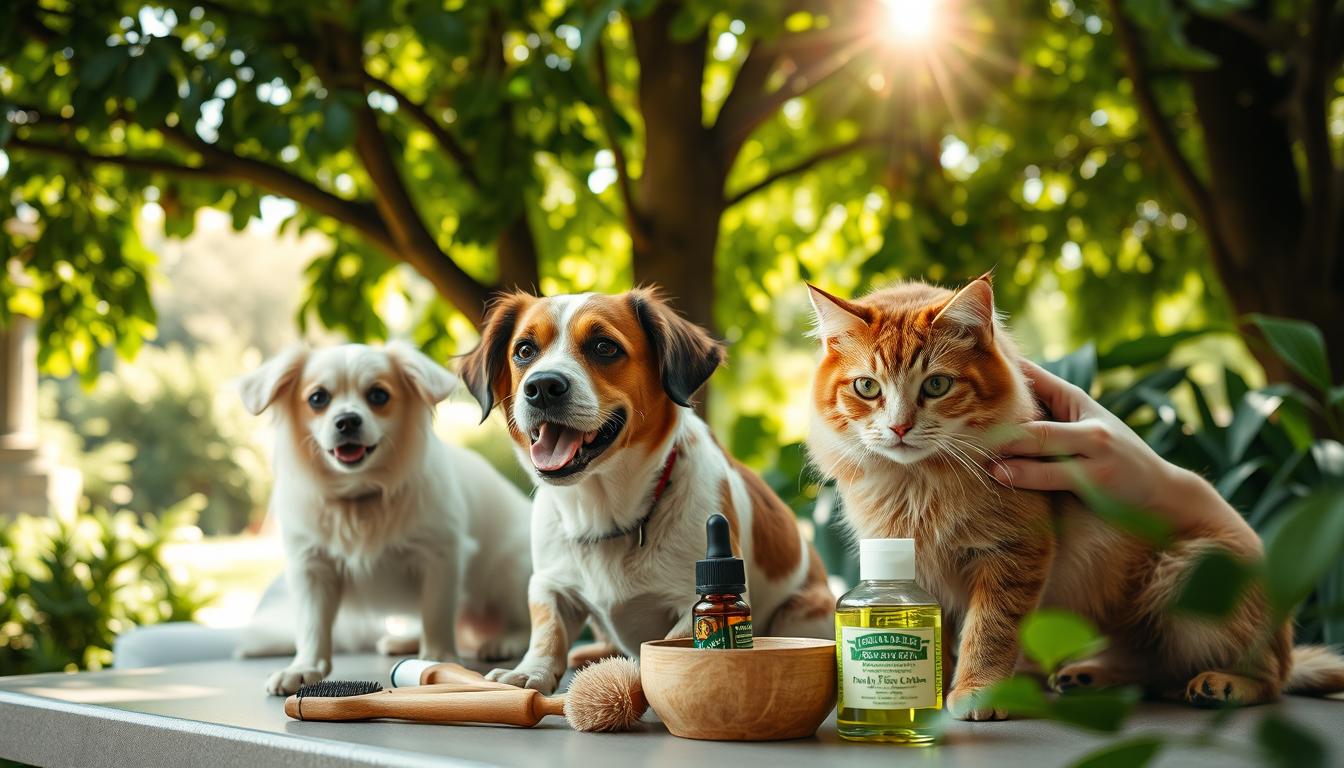As a pet owner, I know how crucial it is to keep my furry friend’s skin and coat healthy. Our pets depend on us for the best care, including their skin health. Whether it’s a playful pup or a cuddly cat, the right skin care routine is key to their happiness and comfort.
In this article, I’ll share effective pet skin care tips to keep your companion healthy and happy. We’ll cover why skin care is important, how to spot and treat common skin issues, and more. We’ll also talk about grooming, nutrition, and natural remedies for better skin and coat health. Get ready to pamper your furry friend and show them the love they deserve!
Understanding the Importance of Proper Pet Skin Care
As pet owners, we often overlook the significance of our furry companions’ skin health. But, keeping their skin healthy is key for their comfort and happiness. The skin acts as a shield, protecting them from the environment and infections. It also helps them stay cool or warm, depending on the weather.
Why Skin Health Matters for Your Furry Friend
Healthy pet skin is more than just looks; it’s essential for their well-being. Skin problems like allergies and infections can make them uncomfortable and even sick. By focusing on their skin health, you can keep them happy and active.
Common Skin Issues in Pets and Their Causes
- Allergies: Pets can develop allergies to things like pollen and dust, causing skin irritation.
- Infections: Bacterial, fungal, and parasitic infections can make your pet’s skin red, itchy, and even cause hair loss.
- Dry skin: Without enough moisture, the skin can become flaky, itchy, and uncomfortable, especially for pets with sensitive skin.
- Hot spots: These are areas of skin inflammation and infection, often caused by too much licking or scratching.
Knowing about common skin issues and their causes can help you keep your pet’s pet skin health in check. This way, you can prevent these problems before they start.
Grooming Routines for Optimal Skin and Coat Health

Keeping your pet’s skin and coat healthy is key to their happiness. A good pet grooming routine can greatly improve your pet’s look and health. We’ll cover the best ways to brush, bathe, and pet nail trim to keep your pet’s skin and coat in great shape.
Brushing your pet regularly is vital. It removes extra hair, spreads natural oils, and stops mats and tangles. The frequency depends on your pet’s fur type. Brush them daily or a few times a week. Be gentle and patient to make sure they’re comfortable.
Bathing your pet is also crucial for dog grooming and cat grooming. Bathe them every 4-8 weeks with a gentle, pH-balanced pet shampoo. Make sure to rinse all the shampoo off to avoid dry skin.
Pet nail trimming is also key for skin and coat health. Long nails can cause pain and lead to scratching and skin irritation. Trim their nails often, or take them to a pet groomer for help.
By adding these grooming steps to your pet’s routine, you’ll keep their skin and coat healthy and shiny. This will make them happier and healthier overall.
| Grooming Routine | Frequency | Benefits |
|---|---|---|
| Brushing | Daily or a few times per week | Removes excess hair, distributes natural oils, prevents matting and tangles |
| Bathing | Every 4-8 weeks | Cleanses the skin and coat, removes dirt and debris |
| Nail Trimming | Every 4-6 weeks | Prevents discomfort and skin irritation from overgrown nails |
Pet Skin Care: Identifying and Treating Skin Conditions

As a pet owner, knowing about common skin issues is key. These include hot spots, yeast infections, mange, and skin allergies. Spotting the signs early helps you care for your pet better.
Signs of Skin Problems to Watch Out For
Pets can show skin problems in many ways. Look for signs like too much scratching, red skin, hair loss, and sores. Regular checks can catch issues early, making treatment easier.
- Excessive itching or licking
- Redness, inflammation, or swelling of the skin
- Flaky, scaly, or crusty skin
- Patches of hair loss or thinning coat
- Skin lesions, bumps, or sores
Natural Remedies vs. Veterinary Treatments
Choosing between natural remedies and vet treatments for pet skin issues is important. Mild irritations might be helped by natural methods. But, serious or ongoing problems need a vet’s care.
| Natural Remedies | Veterinary Treatments |
|---|---|
| Oatmeal baths | Medicated shampoos and creams |
| Coconut oil or aloe vera | Oral or topical medications |
| Dietary supplements | Allergy testing and immunotherapy |
Always talk to your vet to find the best treatment for your pet’s skin issue and health.
Nutrition and Its Impact on Your Pet’s Skin
As a pet owner, I know how crucial a good diet is for my furry friend. What we feed them affects their health, including their skin and coat. By choosing the right food and adding essential nutrients, our pets stay vibrant and healthy.
Choosing the Right Diet for Healthy Skin
I look for pet food rich in quality proteins, healthy fats, and vitamins and minerals. These nutrients are key for skin health and a shiny coat. I also check for food sensitivities or allergies to meet my pet’s needs.
Supplements and Vitamins for Skin Support
Along with a balanced diet, I add supplements and vitamins for extra skin support. Omega-3 and omega-6 fatty acids reduce inflammation and keep skin moist. Vitamins A, C, and E help maintain the skin’s barrier and shine. My vet helps me tailor a plan for my pet’s specific skin needs.

